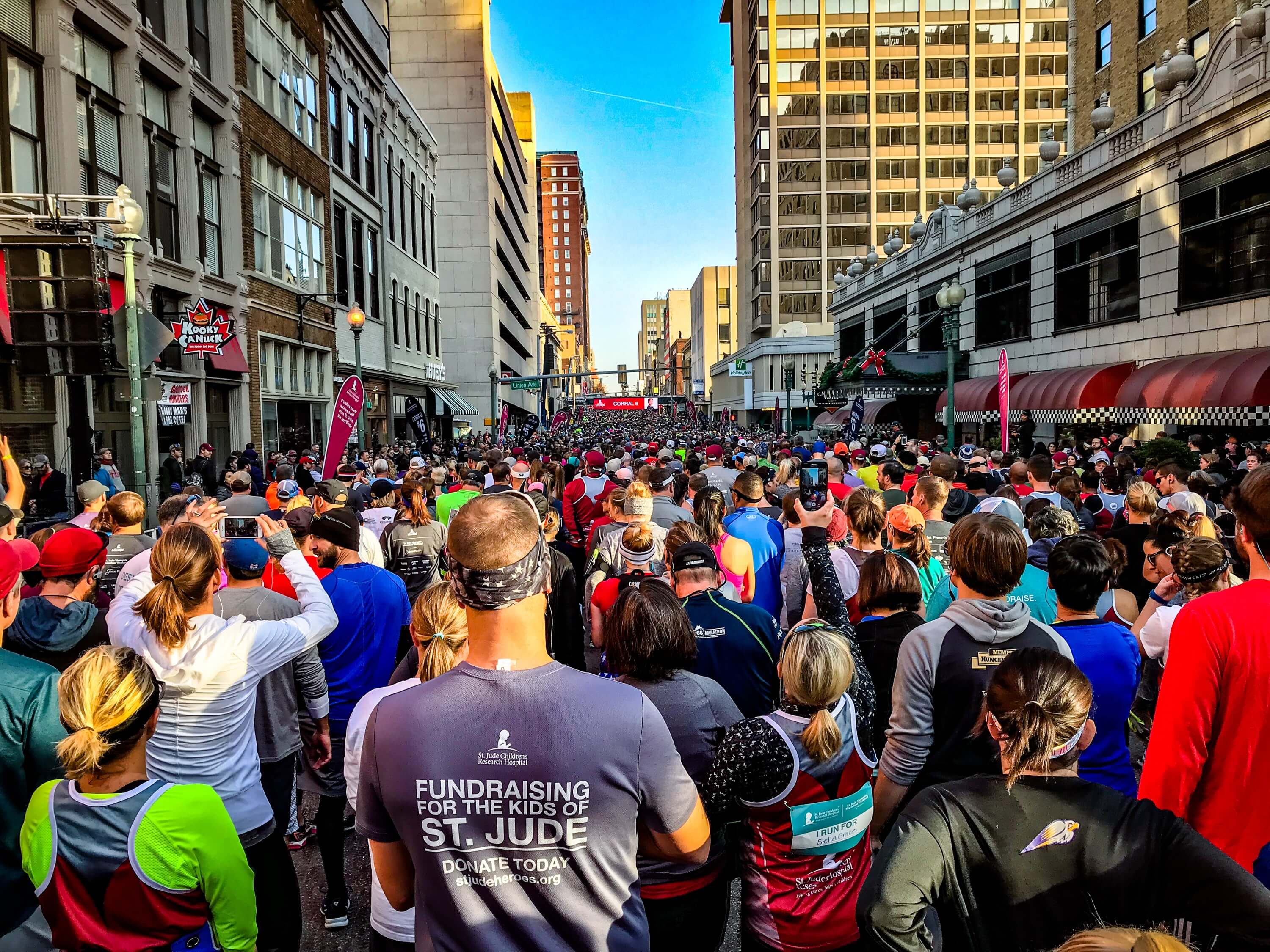Runners Spend This Much On Races Per Year

It is free to run.
This is true, but I bet you just laughed at this. That’s because runners know how much money they shell out to doing the activity. Or do we really know how much it costs to be a runner?
There are obvious necessities like new running shoes, and other apparel, accessories and nutrition, and hydration. But as a runner we live for racing. Yes, we actually pay money (and a pretty penny for some) to run a set distance that we can absolutely do elsewhere for free. But no we wouldn’t pass up a good event. In fact, many runners sign up for their next race immediately following a race just completed.
So how much do runners spend on races per year?

The short answer is it depends.
There are some runners who run a race every few weeks. Some do one every other weekend. There are some that race back-to-back in any given weekend. Or those who try to become a 50 states half marathoner throughout the year.
The average 5k race entry is $30. This doesn’t break the bank, so it’s easy for runners to get a few 5ks under their belt throughout the year.
It costs about $65 on average for a 10k, and about $48 for a half marathon. Half marathons can go up to as much as $100 or more depending on the race.
The Math
According to Statista, the preferred race distance worldwide in 2017 was the half marathon. So let’s focus on doing the math for the distance. In the U.S. in 2016, there were about 1,900 half marathon finishers according to a survey by Statista.
Let’s say the average cost of a half marathon is $95. And let’s assume the runner is participating in a half marathon every other month (6 per year). That is $570 per year.

Now that’s not including the fun 5ks that pop up throughout the year, training 10k runs or obstacle races. This is also not taking into consideration more expensive races like the Disney half marathons. It also is just the race fee alone, not the cost of travel arrangements, hotels, and other training costs.
Another way to break down the math is for those who run a half marathon for each season, one in the fall and one in the spring. This comes to $190, plus an additional $600 assuming they do two 5ks per month for 10 months (rest 2 months per year). That is $790 right there—no including any 10ks or for those who race a lot in specific seasons.
Why Do We Pay Race Fees?
In general, the bigger the race (in terms of size and popularity), the higher the entry fee. This is because it costs more money to organize these events.
The entry fee goes towards the cost of putting on the race. This can be anything from police and traffic control to insurance and permits. The organizers need to hire staff and get the timing equipment. There are registration fees given to online services.
Then there are aid station necessities like water, cups, sports drinks and sometimes nutrition. And let’s not forgot the finish line station with more drinks and food.
And the reason many sign up: the swag. This includes that “free” race t-shirt, medal and other items.
A portion of the fee might also be donated to charity.
How Much Does It Cost To Be A Marathoner?
The feeling of crossing that finish line to be in the small number of people who finish a marathon is priceless. But to actually be able to attend the event it’s so cheap. Okay, it isn’t a crazy amount of money which makes it totally doable. But expect to spend anywhere from $100 to $250.
First, it depends if the runner is participating in a marathon in their country or out of the country. It costs $150 for U.S. residents to run the Boston Marathon in 2012. This price rose to $180 in 2016, and $185 in 2018. International entrants pay $250 to enter the race. This might sound like a steep price for some, but many rationalize it with how popular and prestigious the race is.
The winner (both male and female) of the Boston Marathon get $150,000—which makes it absolutely a race to sign up for those who are pro athletes.
In comparison, it was $295 for non-NYRR members to run the 2018 NYC Marathon and $358 for non-U.S. residents. The winner takes home $100,000, with other cash prizes given to top finishers in the USA Division and Masters Division, as well as other time bonuses for fast male and female runners.
It was $80 to enter this marathon back in 2004.
Keep in mind that many of these popular marathons are based on a lottery system with limited entries. For example, runners have about a one in ten chance to get tiny the 2019 London Marathon after filling out a ballot. It costs just over $90 for overseas entries or $44.39 (39 Euros) for a standard UK entry.
There are more affordable races to sign up for, like the Marine Corps Marathon held in Washington that costs $99 to enter.
Another way to guarantee entry is to become a fundraiser for one of the event’s charities. Runners are expected to raise anywhere from $1,000 to $3,000 for a charity-related entry.
Tips To Saving Money On Race Per Year

Many races offer early bird pricing for their event. Signing up early means saving some serious cash. The closer it gets to the race date, the more expensive it becomes. The only downside is that the runner is then locked into that race, so make sure there is a deferment policy in case of an injury.
Aim for smaller scale races in the runner’s hometown or close to where they live. These are generally cheaper because the cost to organize them is lower. Then focus on maybe one or two “big” races per season to work towards.
Some races have relay options that are cheaper to run a marathon opposed to for footing the entire cost oneself. Some events also offer discounts for running groups who have a certain amount of runners participating.
Raising money for charity is also a great way to wave race fees while giving back in a meaningful way.
Sources
- , Think running is a cheap sport? Check out what New York City Marathon runners are spending , News Website
- , The Cost of Racing: Why Are Entry Fees So Expensive (or Cheap)?, Running Website
- , The 2018 Boston Marathon: By The Numbers, News Website
- , What were the entry fees for the 2018 TCS New York City Marathon? , Race Website
- , Prize Money and Bonus Awards, Race Website
- , How to sign up for the 2019 London Marathon, and how do you actually qualify , News Website
- , TCS New York City Marathon Official Charity Partner Program, Race Website
- , Where Does All The Money Go?, Running Website
- , How Big Business Wrecked the Marathon, News Website
- , What is your favorite race distance?*, Statistics Website
- , The Cost of Racing, Running Blog
Latest Articles
 Is Running on a Treadmill Easier Than Running Outside?Runners have their own preferences, whether it is treadmill running, running outside on the road, or exploring trails. So...
Is Running on a Treadmill Easier Than Running Outside?Runners have their own preferences, whether it is treadmill running, running outside on the road, or exploring trails. So... Is It OK to Use Trail Running Shoes on the Road?While trail running shoes can be used on roads, especially in situations where a runner encounters mixed terrains or pref...
Is It OK to Use Trail Running Shoes on the Road?While trail running shoes can be used on roads, especially in situations where a runner encounters mixed terrains or pref... How to Fix Sore Quads After Running?Rest, ice, gentle stretching, and over-the-counter pain relievers can help soothe sore quads after running. Also, ensure ...
How to Fix Sore Quads After Running?Rest, ice, gentle stretching, and over-the-counter pain relievers can help soothe sore quads after running. Also, ensure ... 10 Fruits With The Most Electrolytes to Replace Sports DrinksThese fruits are high in electrolytes such as potassium, magnesium, and calcium, essential for hydration, muscle function...
10 Fruits With The Most Electrolytes to Replace Sports DrinksThese fruits are high in electrolytes such as potassium, magnesium, and calcium, essential for hydration, muscle function...

